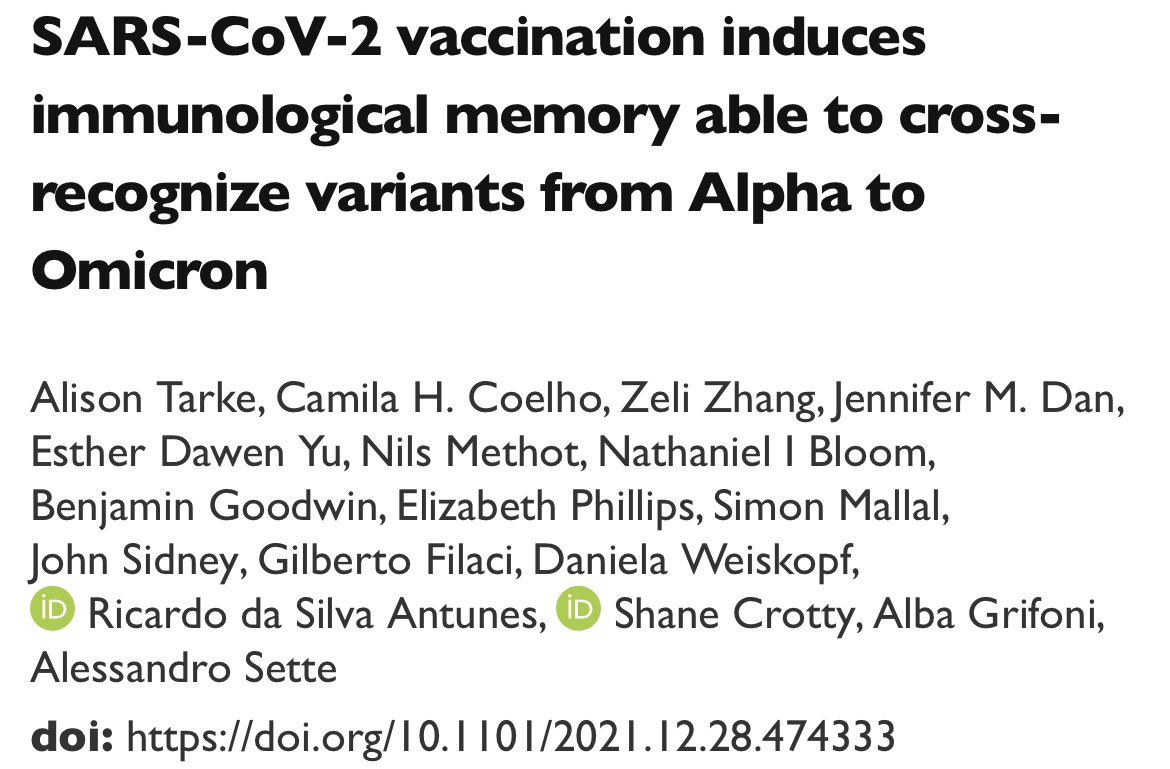Immunity is more than just neutralizing antibodies.
Why? Because MOST of your T-cell responses from vaccination or previous infection STILL recognize Omicron.
Let’s talk about that!🧵
Why? Because MOST of your T-cell responses from vaccination or previous infection STILL recognize Omicron.
Let’s talk about that!🧵
Immunological memory consists of antibodies, memory B-cells, memory CD8+ T-cells, and memory CD4+ T-cells. These responses are what give us enduring protection even against newly emerging SARS-CoV-2 variants. 





Immunological memory is probably the most important feature of immunity as it allows us to better respond when the threat is encountered a second time. Against SARS-CoV-2, it helps to determine protection against reinfection, disease risk, and vaccine efficacy.
As long as your T-cells still recognize this virus and inform your B-cells they need to get to work and adjust to make antibodies to be better “fit” you’re protected. Imagine your B-cells are your sword that need sharpening every now and again and your T-cells are your shield.
The term infection refers to the virus entering and being detectable in your system regardless of whether OR NOT it makes you sick, whereas the term illness refers to the virus entering, being detectable in your system AND making you sick. It it important not to conflate the two. 

T-cell epitopes in natural infection? Their analysis of the full proteome here showed that on average 98% of CD8+ and 95% of CD4+ epitopes were totally conserved. 

T-cell epitopes and vaccination? Here is the analysis of spike-only data. Since many variant mutations are in spike, naturally a higher number of mutated T-cell epitopes. On average 94% of CD8+ and 91% of CD4+ epitopes were still totally conserved. 

When they get to Omicron presumably because of the higher number of mutations, the fraction of CD8+ epitopes that are 100% conserved drops significantly to 95% for CD8+ and 88% for CD4+ whole proteome. Guess what? Still VERY HIGH conservation.
“Despite Omicron's extensive mutations and reduced susceptibility to neutralizing antibodies, the majority of T-cell response, induced by vaccination or natural infection, cross-recognises the variant.”
•medrxiv.org/content/10.110…
•
•medrxiv.org/content/10.110…
•
https://twitter.com/virusmonologues/status/1476221647417921536?s=21

Researchers here assessed the ability of T-cells to react with Omicron spike in participants who were vaccinated with Ad26.CoV2.S or BNT162b2, and in unvaccinated convalescent COVID-19 patients. They found that 70-80% of the CD4+ and CD8+ T-cell response to spike was maintained. 

Moreover, the magnitude of Omicron cross-reactive T-cells was similar to that of the Beta and Delta variants, DESPITE Omicron harbouring considerably more mutations. 





Indeed, South Africa has reported a lower risk of hospitalization and severe disease compared to the previous Delta wave. Cross-reactive T-cell responses acquired through vaccination or infection may contribute to these apparent milder outcomes for Omicron.
You can read more here papers.ssrn.com/sol3/papers.cf… and reuters.com/business/healt…. The resilience of T-cell response demonstrated here also bodes well in the event that more highly mutated variants emerge in the future. MAKE SURE YOU ARE PROTECTED. DON’T WALK AROUND IMMUNE NAIVE.
• • •
Missing some Tweet in this thread? You can try to
force a refresh











